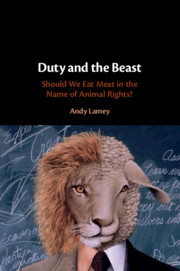Book contents
- Duty and the Beast
- Duty and the Beast
- Copyright page
- Contents
- Acknowledgments
- Introduction: The New Animal Debate
- Chapter 1 The Case for Animal Protection
- Chapter 2 A View to a Kill
- Chapter 3 Burger Veganism
- Chapter 4 The Dinner of Double Effect
- Chapter 5 Killing Them Softly
- Chapter 6 What Is It Like to Be a Chicken?
- Chapter 7 The Logic of the Larder
- Chapter 8 Thinking Like a Plant
- Chapter 9 Long Live the New Flesh
- Bibliography
- Index
Chapter 6 - What Is It Like to Be a Chicken?
Published online by Cambridge University Press: 25 March 2019
- Duty and the Beast
- Duty and the Beast
- Copyright page
- Contents
- Acknowledgments
- Introduction: The New Animal Debate
- Chapter 1 The Case for Animal Protection
- Chapter 2 A View to a Kill
- Chapter 3 Burger Veganism
- Chapter 4 The Dinner of Double Effect
- Chapter 5 Killing Them Softly
- Chapter 6 What Is It Like to Be a Chicken?
- Chapter 7 The Logic of the Larder
- Chapter 8 Thinking Like a Plant
- Chapter 9 Long Live the New Flesh
- Bibliography
- Index
Summary
A popular view holds that no wrong is done to an animal when it is killed painlessly. In arguing against this view in the previous chapter, I granted for the sake of argument that chickens are merely sentient. I framed the discussion this way to make clear that the case against anti-speciesist versions of humane slaughter does not depend on revisionary claims about the cognitive abilities of food animals. Contemporary science, however, suggests that the cognitive abilities of chickens are more extensive than is generally recognized, to the point that they possess a primitive form of self-consciousness. If chickens have mental abilities that place them in an intermediate status between merely sentient beings and persons, this will have bearing not only on the arguments I examined in the last chapter, but on any attempt to justify slaughtering them, including attempts that employ Singer’s or potentially other versions of protectionist theory. The revised understanding of chicken cognition thus poses a separate challenge to protectionist arguments for humane slaughter, independent of the challenge posed by the time-relative interest account. The version of primitive self-consciousness that I defend innovates on previous versions to include a primitive ability to conceive of oneself through time.
Keywords
- Type
- Chapter
- Information
- Duty and the BeastShould We Eat Meat in the Name of Animal Rights?, pp. 153 - 176Publisher: Cambridge University PressPrint publication year: 2019

